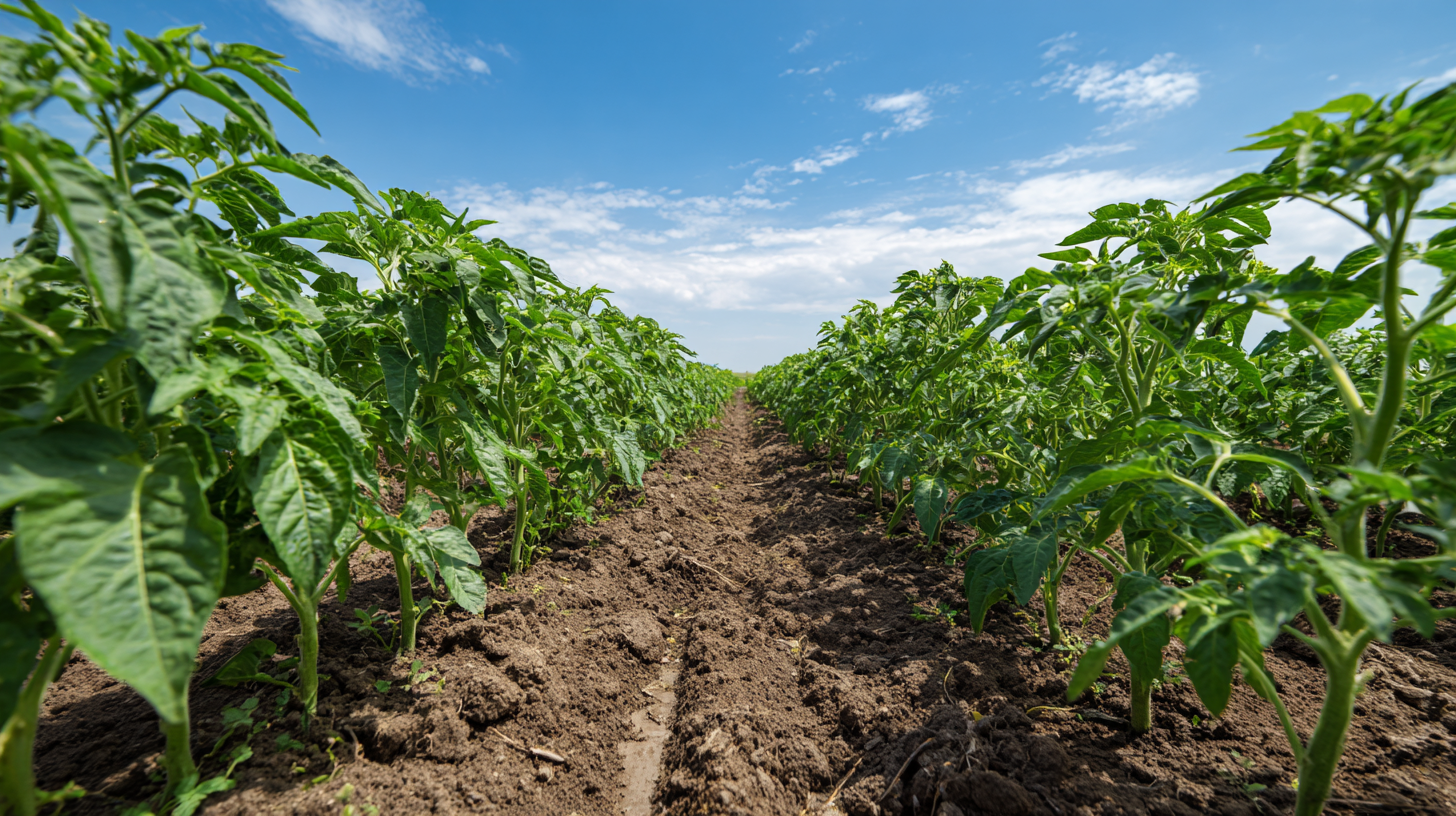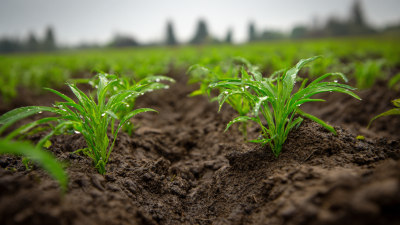The rising demand for sustainable agricultural practices has driven the need for efficient fertilization methods, leading to an increased focus on Water Soluble Nitrogen Rich Fertilizer. According to a report by MarketsandMarkets, the global water-soluble fertilizers market is projected to reach $18.2 billion by 2025, growing at a CAGR of 6.7% from 2020. This growth highlights the crucial role that Water Soluble Nitrogen Rich Fertilizer plays in improving nutrient uptake efficiency and minimizing environmental impact through targeted application. Studies indicate that up to 30% more nitrogen can be absorbed by plants when using water-soluble forms compared to traditional fertilizers. As agriculture seeks to balance productivity with ecological responsibility, these fertilizers offer a potent solution for optimizing crop yields while supporting sustainable practices in farming.

Water soluble nitrogen rich fertilizers (WSNRF) have gained prominence in sustainable agriculture due to their easily accessible nutrient composition. Typically composed of ammonium nitrate, urea, and other soluble nitrogen sources, these fertilizers enable optimal nutrient uptake for plants, significantly enhancing growth and yield. According to the Fertilizer Institute, water soluble nitrogen fertilizers can increase crop yields by up to 30% compared to traditional fertilizers, making them a vital tool for modern agricultural practices.
Applying WSNRF also allows for precise nutrient management. This is essential in minimizing environmental impact, particularly in reducing nitrogen leaching into waterways, a significant concern as highlighted in a 2021 report by the Food and Agriculture Organization (FAO). Moreover, these fertilizers support improved soil health and structure, contributing to a more sustainable agricultural system.
**Tips:** To maximize the effectiveness of water soluble nitrogen fertilizers, consider applying them at the early growth stage of crops when nutrient demand is high. Additionally, use soil testing to tailor the fertilizer type and application rate, ensuring optimal crop health while minimizing waste.
Water soluble nitrogen fertilizers are becoming increasingly popular in sustainable agriculture due to their ability to enhance crop yields significantly. These fertilizers dissolve quickly in water, allowing farmers to deliver nitrogen directly to plants through irrigation systems or foliar applications. The immediate availability of nitrogen promotes vigorous plant growth, improves nutrient uptake, and ultimately leads to higher productivity. By optimizing nitrogen supply, these fertilizers can also minimize the risk of nutrient leaching, making them an environmentally friendly option.
Tip: To maximize the effectiveness of water soluble nitrogen fertilizers, consider applying them during the early growth stages of your crops. This timing ensures that plants receive the necessary nutrients when they need them most, promoting healthier growth and increased yield potential.
Moreover, adopting a careful management strategy when using these fertilizers can further enhance their benefits. Monitoring soil nutrient levels and crop health allows farmers to adjust application rates accordingly, ensuring that plants receive just the right amount of nitrogen. This precision not only boosts yields but also minimizes the environmental impact associated with over-fertilization.
Tip: Utilize soil testing to determine the baseline nutrient levels before application. This practice helps in tailoring the fertilizer input to meet crop needs precisely, leading to more sustainable farming practices.
Water-soluble nitrogen-rich fertilizers play a pivotal role in sustainable farming practices, providing essential nutrients in an easily accessible form for crops. These fertilizers enhance nutrient uptake efficiency, reducing the potential for nutrient leaching into groundwater. By delivering nitrogen directly to the plant, farmers can optimize growth rates and yield while minimizing the environmental impact. The precise application of water-soluble nutrients also allows for tailored nutrient management, ensuring that each crop receives exactly what it needs at different growth stages.

Integrating water-soluble fertilizers into sustainable farming systems empowers farmers to adopt more responsible practices. Such integration can involve using fertigation techniques, allowing for the simultaneous application of water and nutrients, which promotes efficient water use and reduces waste. Additionally, when combined with organic farming methods, these fertilizers can help balance soil health and fertility, promoting biodiversity and resilience in agricultural systems. Overall, the adoption of water-soluble nitrogen-rich fertilizers is a strategic approach to enhance sustainability in agriculture, fostering a balance between productivity and environmental stewardship.
Water soluble nitrogen-rich fertilizers have emerged as a vital tool in sustainable agriculture, particularly for their potential to mitigate environmental impacts. One of the primary concerns associated with traditional fertilizers is nutrient runoff, which often leads to water pollution and harmful algal blooms. Unlike granular fertilizers that are prone to leaching during rainfall, water soluble options dissolve readily in water, allowing for more precise application and reduced excess runoff into nearby water bodies.
The use of water soluble fertilizers enables farmers to tailor nutrient delivery directly to crop needs, enhancing efficiency and minimizing waste. By facilitating better absorption, these fertilizers contribute to improved soil health and crop yields without the environmental repercussions often linked to conventional fertilizers. As agricultural practices increasingly prioritize sustainability, the adoption of water soluble nitrogen-rich fertilizers presents a promising strategy to balance productivity with ecological stewardship, fostering a more resilient agricultural ecosystem.
This chart illustrates the impact of water soluble nitrogen rich fertilizers on reducing nutrient runoff in sustainable agriculture. The data represents the percentage decrease in runoff when using water soluble fertilizers compared to traditional fertilizers over a survey period.
 Water soluble nitrogen rich fertilizers play a crucial role in sustainable agriculture by ensuring that crops receive essential nutrients in an efficient manner. The precision application of these fertilizers, now enhanced by technological innovations, offers farmers the ability to deliver nutrients exactly when and where they are needed. This can significantly reduce waste and environmental impact, while simultaneously maximizing crop yields. Technologies such as drone-based thermal sensors and integrated sensor networks enable farmers to monitor and optimize their fertilization strategies in real-time, helping to achieve more targeted nutrient application and minimizing nitrate losses.
Water soluble nitrogen rich fertilizers play a crucial role in sustainable agriculture by ensuring that crops receive essential nutrients in an efficient manner. The precision application of these fertilizers, now enhanced by technological innovations, offers farmers the ability to deliver nutrients exactly when and where they are needed. This can significantly reduce waste and environmental impact, while simultaneously maximizing crop yields. Technologies such as drone-based thermal sensors and integrated sensor networks enable farmers to monitor and optimize their fertilization strategies in real-time, helping to achieve more targeted nutrient application and minimizing nitrate losses.
Moreover, recent developments in the production of green ammonia provide an exciting avenue for farmers looking to use more sustainable fertilization practices. By relying on renewable energy sources rather than traditional fossil fuels, these methods not only reduce the carbon footprint of fertilizer production but also align with the growing demand for environmentally friendly agricultural solutions. As farmers increasingly adopt these techniques, they can enhance soil fertility and crop health, fostering a more sustainable agricultural landscape that benefits both the economy and the environment.






